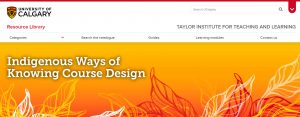Module 1 – post 4
In our course discussion posts and research blogs, I have felt some discomfort because there are some significant differences in how we try to “objectively” talk about Indigenous ways of knowing, education, and technology in academia, versus how I’ve been discussing these topics with fellow Indigenous family, friends, and peers. When reading the research papers and academic articles, even when it is an Indigenous author, I feel like they are talking outwards, away from the Indigenous community, and to an audience that doesn’t know our ways, or the way we must exist in a western world.
I found an amazing article by Joseph P. Gone that describes some of my discomforts when discussing “Indigenous Research Methodologies“, and I’m sure I will think about their paper throughout the rest of this course.

This particular quote (which I split into two paragraphs for easier reading) stood out to me:
“I worry that the way we practice IRMs insulates inquiry in the name of Indigeneity from skeptical interrogation. The hallmark of academic knowledge production is that it gets critiqued by your peers, people who know your field, who are experts in your specialization… And until you can answer them, or rebut what they have to say, you’re not going to go forward in being able to publish what you say, for example, or what you think. And so, one concern I have is by saying that “this is IRMs,” what we’re really saying is “and you White people don’t know this. This is ours. And so, you White people aren’t allowed to critique it because you wouldn’t know anyway. It’s for us to decide and critique and say what’s right.” And what that can translate into is actually no one critiques it because we have a stake in celebrating these things.
And I’d say in traditional communication styles, especially around knowledge translation and transmission, you don’t critique people. That’s the heart of rudeness, right? You’re not going to sit there and tell an elder, “Well, I think . . .,” if you’re getting the usual monologue, right? That’s not how it works. So, the danger here is that we’re withdrawing all the things that we most care about and are invested in from the usual processes of critique. And that deprives us of the opportunity to refine what we’re doing in ways that can be really important. And, of course, beyond that it completely excludes us from academia. Almost everyone in academia says, “If you’re not willing to play this game, fine, go do your own thing. See ya.” And you become [that which] happens to many Native American Studies programs is you’re really, really marginal in the academy.” (p. 50-51)
Gone, J. P. (2019). Considering Indigenous research methodologies: Critical reflections by an Indigenous knower. Qualitative Inquiry, 25(1), 45-56. https://doi.org/10.1177/107780041878754


